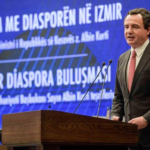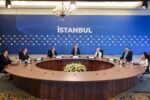German policy towards the Western Balkans is facing new challenges: the new composition of the parliament in Brussels, the possible return of Trump and the increasingly unstable situation in the region itself.
Twenty years after the last major expansion of the European Union is an opportunity to take a look at German foreign policy during this period, especially regarding relations with the countries of South-Eastern Europe, most of which expect to join the EU.
Therefore, this week in the German parliament there was a lot of discussion about these topics, not even as usual in committees or sessions, but in special forums, which are related in one way or another to Southeast Europe.
Brnabić did not participate in the forums
In his position as Secretary of State in the Ministry of Foreign Affairs, in the first cabinet of Angela Merkel, Gernot Erler shaped to a considerable extent the direction of German foreign policy also related to South-Eastern Europe. The social-democratic politician was one of those who strongly committed to the recognition of Kosovo, which, as Christian-democratic politician and panelist Peter Beyer said, was not self-evident in political Berlin.
On the same day and at the same time that the forum was being held, the new Speaker of the Assembly of Serbia and the former Prime Minister of Serbia, Ana Brnabic, was visiting the Bundestag building, but she did not participate in the activities organized by the Association for Southeast Europe (SOG). .
In addition to Peter Beyer and Manuel Sarrazin, the chairman of the SOG and the German government’s special envoy for South-Eastern European affairs, Enver Hoxhaj, vice-president of the Kosovo Assembly and former Minister of Foreign Affairs of Kosovo, was also present at the forum .
Possible new conflicts in the Balkans
Asked by DW about the renewal of armed conflicts in the Balkans, Erler said that this option is possible due to the recent deterioration of relations between Kosovo and Pristina. “We must also bear in mind that it is in Putin’s interest to instigate a new armed conflict in Europe, which would divert attention from the war in Ukraine and represent the worst possible scenario for the West,” Erler said. .
Hoxhaj does not think that between Kosovo and Serbia there can be new conflicts like the one in the late nineties. “But at the same time it must be said that until recently no one believed that there were still soldiers who were ready to attack NATO soldiers, as happened last year in the north of Kosovo”, warned the former foreign minister. He said that “Serbia is ready to do a lot to annex the north of Kosovo”.
In his interview for DW, Erler expresses several times his surprise at the fact that Serbian President Aleksandar Vučić manages to sell himself as a big supporter of Serbia’s membership in the European Union, while on the other hand he works in favor of Russia. “I am surprised that Brussels has now decided to end negotiations with Georgia due to the adoption of laws favoring Russia, when at the same time Serbia makes much greater concessions to the Kremlin,” said Erler.
Fear of Grenell and Trump
During the forum, the issue of changing global relations and the impact on Southeast Europe in the event of Donald Trump’s re-election was repeatedly mentioned. The representative of the Christian Democrats and the former rapporteur for the Western Balkans of the parliamentary group of the Christian Democrats in the Bundestag, Peter Beyer, paid particular attention to the former ambassador of Trump in Berlin and the subsequent special envoy of the White House for the negotiations between Serbia and Kosovo , Richard Grenell.
“Grenell has been constantly in the region and again in recent years under who knows what excuse,” said Beyer, who has been coordinator for transatlantic relations in Angela Merkel’s government. He expressed the fear that if Trump comes to power again, the issue of the exchange of territories between Kosovo and Serbia, which the EU and Germany reject as an extremely dangerous option, could be put up for discussion again.
“Trump is convinced that if he comes to power, he will end the war in Ukraine within a day, and he probably thinks that he will also solve the problem of Serbia and Kosovo. I think we have to prepare for many things. And this applies not only to Serbia and Kosovo, but also to Bosnia-Herzegovina”, warned Beyer.
The Western Balkans in the background even in Brussels
The forum also talked about the EU’s focus on the Western Balkans after the changes in Brussels, because the new composition of the EU Parliament and Commission may relegate the Western Balkans to the background.
“There is a risk that the new assembly of the European Parliament will focus entirely on the Ukrainian problem and turn its back on the Western Balkans. This is dangerous because even in this region there is a risk of igniting old conflicts and creating new hotspots”, said one of the participants of the forum, the former vice president of the Bulgarian government, Meglena Pugaçieva.
Pressure on the media is constantly mentioned as one of the problems that hinders the countries of the Western Balkans towards the EU. This was said several times in the forums held in the Bundestag. Xhabir Memedi Deralla, a journalist and human rights activist from North Macedonia, this year’s winner of the Journalist Solidarity Award of the Association for Southeast Europe (SOG), spoke about the problems faced by the media./DW







